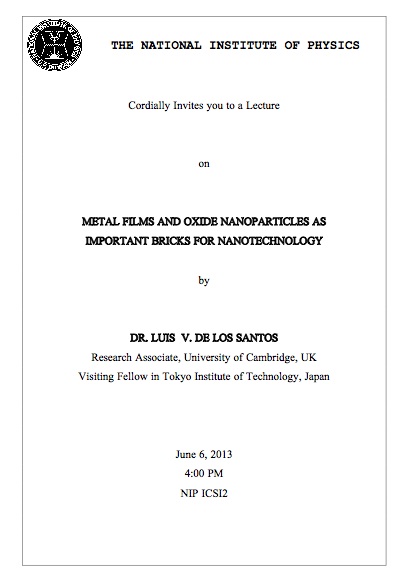METAL FILMS AND OXIDE NANOPARTICLES AS IMPORTANT BRICKS FOR NANOTECHNOLOGY
Metal films and oxide nanoparticles as important bricks for nanotechnology Dr. Luis De Los Santos Valladares
Cavendish Laboratory, University of Cambridge, J.J. Thomson Av., Cambridge CB3 0HE, UK.
Dr. De Los Santos is a matter condensed physicist and specialist in the preparation and characterization of different materials and their applications in nanotechnology. He is a Research Associate at the University of Cambridge (UK) and a Visiting Fellow in the Tokyo Institute of Technology (Japan). He has published a considerable number of scientific articles. His works has being funded mainly by the European Commission, the JSPS (Japan), the EPSRC (UK) and the CAPES (Brazil). Abstract In this talk, different types of thin metal films and oxide nanoparticles are discussed for their utilization in nanotechnology: gold, copper and nickel films, nickel nanoelectrodes, oxide nanograin superconductors, iron oxide nanoparticles and graphene oxide flakes. The potential use of these materials in nanoelectronics and medicine will be emphasized. The crystallization and surface morphology of gold, copper and nickel films on SiO2/Si substrates are investigated as a function of annealing temperature. For example, in the case of gold, annealing improves crystallization and changes the morphology of the surface. In the case of the Au films surface diffusion causes cluster formation. In the case of Cu films, oxides are formed with phase evolution CuCuCu2OCu2OCu2O + CuOCuO. A similar case occurs in nickel films. Regarding, oxides nanoparticles, superconductor LaCaBaCu3O7 (La1113), iron oxide are reviewed. The attachment of some particles on Au(111) surfaces through self-assembled monolayers of HS-C8H16-HS [octane (di)thiol] is investigated for potential application in nanotransistors.



